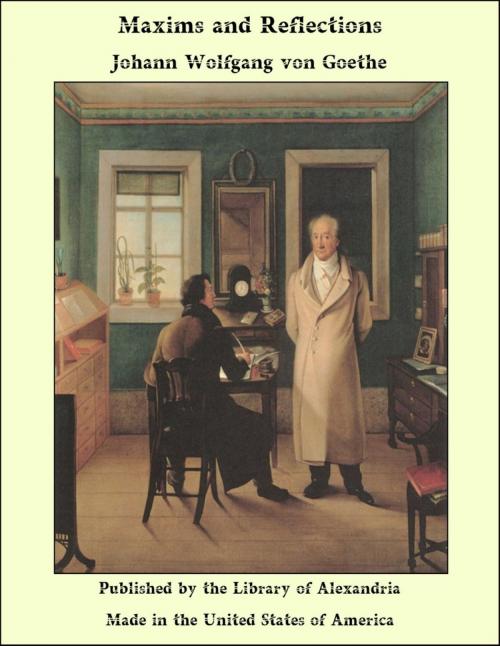| Author: | Johann Wolfgang von Goethe | ISBN: | 9781465591258 |
| Publisher: | Library of Alexandria | Publication: | March 8, 2015 |
| Imprint: | Language: | English |
| Author: | Johann Wolfgang von Goethe |
| ISBN: | 9781465591258 |
| Publisher: | Library of Alexandria |
| Publication: | March 8, 2015 |
| Imprint: | |
| Language: | English |
The translation of Goethe's "Prose Maxims" now offered to the public is the first attempt that has yet been made to present the greater part of these incomparable sayings in English. In the complete collection they are over a thousand in number, and not more perhaps than a hundred and fifty have already found their way into our language, whether as contributions to magazines here and in America, or in volumes of miscellaneous extract from Goethe's writings. Some are at times quoted as though they were common literary property. To say that they are important as a whole would be a feeble tribute to a work eloquent for itself, and beyond the need of praise; but so deep is the wisdom of these maxims, so wide their reach, so compact a product are they of Goethe's wonderful genius, that it is something of a reproach to literature to find the most of them left untranslated for the sixty years they have been before the world. From one point of view, the neglect they have suffered is in no way surprising: they are too high and severe to be popular so soon; and when they meet with a wide acceptance as with other great works, much of it will rest upon authority. But even for the deeper side of his writings, Goethe has not been denied a fair measure of popular success. No other author of the last two centuries holds so high a place, or, as an inevitable consequence, has been attacked by so large an army of editors and commentators; and it might well be supposed by now that no corner of his work, and least of all one of the best, had remained almost unnoticed, and to the majority unknown. Many of these maxims were early translated into French, but with little success; and even in Germany it was only so late as the year 1870 that they appeared in a separate form, with the addition of some sort of critical comment and a brief explanation of their origin and history.
The translation of Goethe's "Prose Maxims" now offered to the public is the first attempt that has yet been made to present the greater part of these incomparable sayings in English. In the complete collection they are over a thousand in number, and not more perhaps than a hundred and fifty have already found their way into our language, whether as contributions to magazines here and in America, or in volumes of miscellaneous extract from Goethe's writings. Some are at times quoted as though they were common literary property. To say that they are important as a whole would be a feeble tribute to a work eloquent for itself, and beyond the need of praise; but so deep is the wisdom of these maxims, so wide their reach, so compact a product are they of Goethe's wonderful genius, that it is something of a reproach to literature to find the most of them left untranslated for the sixty years they have been before the world. From one point of view, the neglect they have suffered is in no way surprising: they are too high and severe to be popular so soon; and when they meet with a wide acceptance as with other great works, much of it will rest upon authority. But even for the deeper side of his writings, Goethe has not been denied a fair measure of popular success. No other author of the last two centuries holds so high a place, or, as an inevitable consequence, has been attacked by so large an army of editors and commentators; and it might well be supposed by now that no corner of his work, and least of all one of the best, had remained almost unnoticed, and to the majority unknown. Many of these maxims were early translated into French, but with little success; and even in Germany it was only so late as the year 1870 that they appeared in a separate form, with the addition of some sort of critical comment and a brief explanation of their origin and history.















